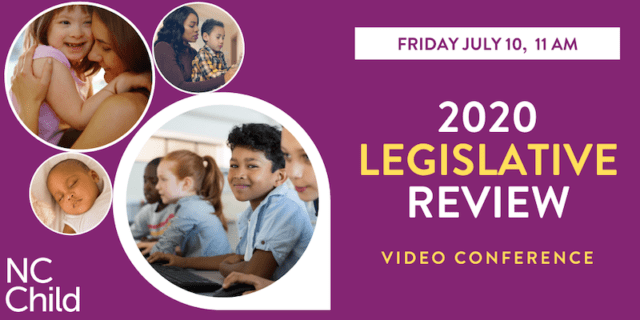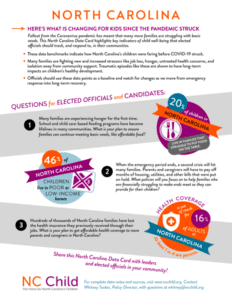As North Carolina slogs through its fourth month of pandemic, COVID-19 cases continue to rise. 1,400 North Carolinians have died of COVID-19, with the greatest share of this burden falling to low-income North Carolinians, especially people who are Black or Latinx. Over 1 million North Carolinians have applied for unemployment benefits since March 15th. Many thousands have lost their employer-provided health insurance along with their jobs. Families are suffering at an unprecedented level, with demand on food banks at an all-time high. Normal support systems like schools, child care, summer camps, church, and even grandparent care are off-limits for many families.
Against this backdrop, the North Carolina General Assembly conducted the 2020 “short” legislative session, wrapping up most business on June 26th. Together with child advocates from across the state, we called on our state’s leaders to move swiftly to provide much-needed relief to families. NC Child’s 2020 legislative agenda focused on five major areas to help kids come through the COVID-19 pandemic: Child Care, Health Care, Hunger & Nutrition, Technology Infrastructure, and Child Welfare.
The results were quite mixed. While state legislators did enact a number of measures to ease the pressure, they still have not allocated all of the federal CARES Act stimulus funds sent to North Carolina. Hoping for some additional guidance from Congress that would let them use stimulus funds to plug state budget holes, legislators have left over half a billion in federal CARES Act funds unspent.

For a full run-down of the 2020 legislative session, tune in Friday at 11 am to our Legislative Update, where our policy team will provide a full overview and answer your questions. Email debra@ncchild.org for the link to join.
Good news from the short session
Hunger & Nutrition
Before this pandemic hit North Carolina, one in five children faced hunger on regular basis. Through HB 1023, legislators allocated $6 million to the state’s food banks to help meet increased demand, as well as more than $75 million to NC DPI to fund remote school nutrition programs. HB 1023 also provided funds to allow all students who qualify for free and reduced-price meals to receive free school meals during the 2020-21 school year.
Early Childhood Education
Currently one-third of all child care facilities in North Carolina are closed. Funding is needed now to ensure that (1) those that remain open can operate safely, and (2) child care businesses can survive and re-open at full capacity, so that North Carolina’s parents can get back to work when this crisis passes. The NC General Assembly directed $20 million in child care relief to NC DHHS via SB 808.
While this funding is just a fraction of the $125 million requested by the early childhood community, we are pleased that NC legislators recognized the importance of child care to the state’s families and economy. We are urging Congress to direct dedicated funding to child care in its next coronavirus relief package.
Good, but falling short
Child Welfare
Social distancing and school closures have increased stress and isolation for the 12,000 children in foster care in our state, putting them at significantly increased risk of harm. The COVID-19 Recovery Act (HB 1043) provided monthly supplemental foster care payments ($100 per child) for the months of April-June 2020, to help keep children in stable foster care homes. The bill also allocated $290K for the LINKS program, a foster care support program for youth ages 13-21, to support youth who need assistance with housing or transitional costs due to the COVID-19 emergency.
However the NC General Assembly did not allocate any funds to enable virtual child welfare visitation and virtual court hearings, including tools for social workers, children and families. We continue to see an inconsistent, county-by-county approach to virtual vs. in-person visitation.
Technology Infrastructure
North Carolina’s public agencies must be able to provide services virtually, including application and enrollment in life-saving programs like SNAP, WIC, and Medicaid. Through SB 808, legislators allocated funding for NCDHHS to strengthen the online application process for public benefit programs, by upgrading the NC FAST system. That’s good news.
However, the legislature missed the chance to make a real dent in the digital divide by failing to take up the FIBER NC Act. State restrictions on local government broadband infrastructure are still keeping many people away from high-speed internet. This is becoming even more urgent as the new school year approaches. Particularly in rural NC, far too many families do not have the access they need to participate effectively in remote learning, telehealth, apply for jobs, apply for benefits, and more.
Missed Opportunities
Perhaps the biggest missed opportunity of the 2020 legislative session is the General Assembly’s failure to expand Medicaid. COVID-19 is unlike any health crisis our state and country has experienced before. Over a million people in North Carolina are facing a pandemic with no health insurance whatsoever. The financial impacts may be devastating for families, as well as for our hospitals and health systems.
Expanding Medicaid would have bolstered our health systems and families against this pandemic, cut the number of uninsured in half, and created a glide path towards economic recovery when this crisis is over. Expansion would immediately unlock billions in federal funding to North Carolina’s health systems to fight COVID-19 and promote economic recovery.
Take action: Call on legislators to expand Medicaid
The most important factor in the 2020 legislative session was your voice. We were able to achieve what we did because parents, early childhood educators, pediatricians, and child advocates like you made sure that their legislators understood how COVID-19 is affecting children and families.
 After this week, the NC General Assembly is expected to stand adjourned until September 2nd. As they campaign for re-election, make sure you are connecting with them. Our 2020 County Data Cards can help. The data cards contain important questions you can ask candidates for office to help understand their positions on the issues most important for children’s health and well-being in North Carolina. Download your county’s 2020 Data Card here.
After this week, the NC General Assembly is expected to stand adjourned until September 2nd. As they campaign for re-election, make sure you are connecting with them. Our 2020 County Data Cards can help. The data cards contain important questions you can ask candidates for office to help understand their positions on the issues most important for children’s health and well-being in North Carolina. Download your county’s 2020 Data Card here.
Together, we are the voice for North Carolina’s children. Support NC Child with a donation today.

